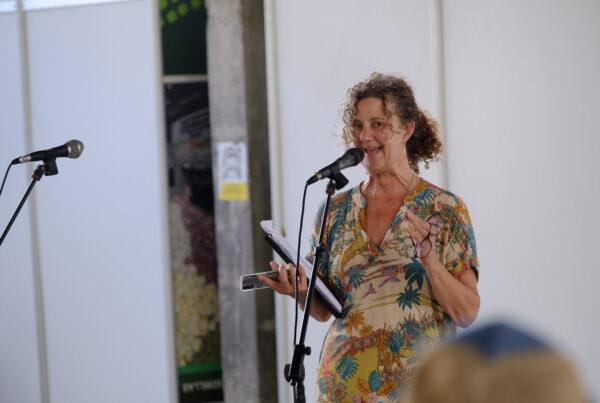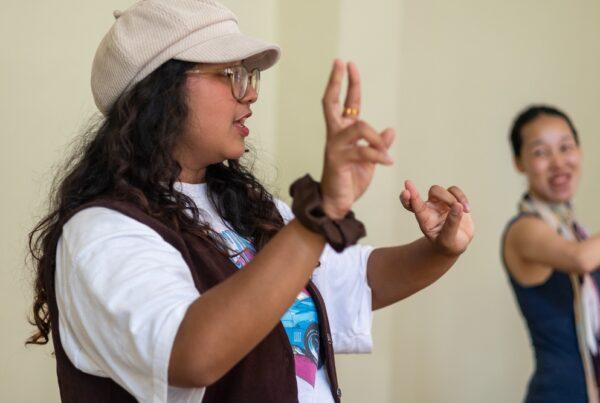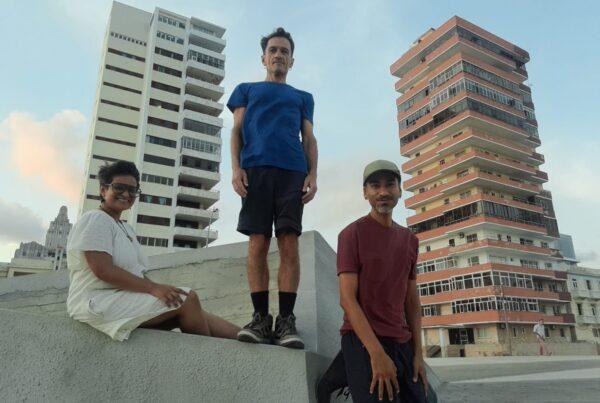Vice President of ASSITEJ Japan and Artistic director of the ricca ricca festa, the international Theatre Festival Okinawa for Young Audiences, Hisashi Shimoyama, has been attending the performances of this years’ Gathering with attention. As the director of the Rico Rico Fest, one of the main reason he has made his way to Novi Sad is to scout for performances which he could include in his festival’s programme in 2025.
Held annually around July, the ricca ricca festa is a family theatre that is mostly consisted of children’s performances, with a selection for adults too. This year’s festival was the 21st,” explains Shimoyama through his translator as we sit outside one of the festival’s venues.
As an established and long standing festival, Shimoyama has already finalised the lineup for 2024, but is actively programming the next fest in line. Hosting both Japanese and International performances, “the biggest reason for me coming here (to the Artistic Gathering) is to see performances,” says Shimoyama. As his translator explains, Shimoyama often goes to Europe to see performances but he doesn’t really have the chance to see eastern European plays that much, so he was interested in seeing some Croatian or Serbian plays to see if he can include them in the festival.”
Back in 2010, Shimoyama invited the Serbian National Theatre to the ricca ricca festa in 2008 and 2010. “While he is here, he is looking for non verbal plays because the festival he’s holding is mostly consisted of Japanese and Asian children who don’t really understand English, he wants so everyone to understand,” adds his translator. Shimoyama is also adamant to add that he agrees with the fact that there are ways to include subtitles in performances, but he estimates that children will only be looking at the subtitles and not the performances and so he thinks that non verbal is the better option,” she adds. “He believes it’s better to look at people’s eyes and their movements and understand their emotions and what they’re performing.
Asked about his opinion and experience during this year’s gathering, Shimoyama recalls the fisrt ASSITEJ Artistic Gathering that took place in Okinowa in 2012. “There were participants from 48 countries and there 88 plays,” he says and he was in attendance. And from what he’s seen so far, “people have become better and better at their work throughout these years, the concentration has shifted towards making new plays and the ways of making news plays, it’s very important for this gathering to be in Serbia and this part of the word,” says Shimoyama.
He goes on to explain (in translation) that his festival doesn’t only include performances, it also includes discussions and a symposium that have different themes every year. “This year we held a symposium on how youth and children theatre can have an impact on making peace in the world, we had a guest from Kiev Ukraine who was talking about how we can help children who are affected by war. Next year we intend of inviting someone from Palestine.”
Another topic that was addressed in the symposium was suicide amongst youth. “We are spreading knowledge about that, and we want to try and see how theatre can help these children.” The overarching theme of the festival has long been ‘Theatre is medicine for life’, thus Shimoyama’s adamancy to select performances that can help youth navigate certain issues.

Melissa Hekkers is a freelance journalist and author.
Her most recent book, Amir’s Blue Elephant, a creative non-fiction based on her experiences working in the Moria refugee camp in Lesvos, Greece and Cyprus. In 2018, she launched the My Cyprus Mandala Series, colouring books inspired by the natural and cultural heritage of Cyprus. In 2007, she published her first children’s book in both English and Greek entitled Crocodile, which won the Cyprus State Illustration Award. In 2012, she launched her second children’s book Flying across Red Skies (in English and Greek), using an experimental approach to literature, for which she was nominated for the Cyprus State Literary award. Her third, similarly well-received children’s book was Pupa (Greek and English), published in 2014 and was adapted as a theatre play in 2019. In between her last two books, she published her first free-verse poetry book entitled Come-forth. In 2019 she was contributing author to the anthology Nicosia Beyond Barriers: Voices from a Divided City, published by Saqi Books, London.





